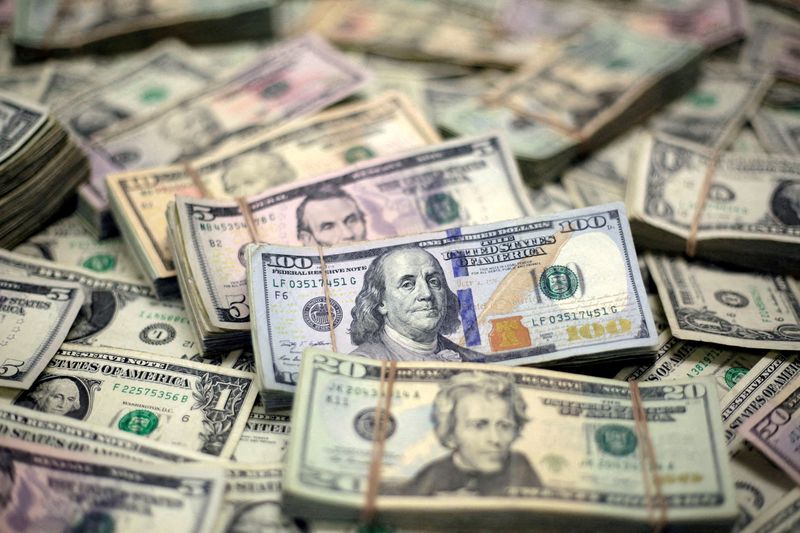By Ankur Banerjee
SINGAPORE (Reuters) – The dollar clung to seven-week highs against major currencies on Tuesday as investors ponder the outlook for U.S. rates after a strong jobs report last week dashed bets for large rate cuts, while escalating tensions in Middle East dented risk sentiment.
Traders have drastically shifted their monetary easing expectations from the Federal Reserve this year.
Markets are no longer fully pricing in a rate cut in November and are ascribing an 86% chance of a 25 basis points (bps) reduction, the CME FedWatch tool showed. Just 50 bps of easing is priced in by December, down from over 70 bps just a week earlier.
That has kept the dollar on the front foot and surging to a multi-week high against the euro, sterling and the yen.
The dollar index, which measures the U.S. unit against major rivals, last fetched 102.41, just below the seven-week high of 102.69 it touched on Friday.
A shallower path of cuts from the Fed, coupled with strong data and the prospect of a ‘no landing’ scenario has helped support the dollar, said Kieran Williams, head of Asia FX at InTouch Capital Markets.
“While the USD has room to strengthen from here, given the hawkish repricing post-FOMC other catalysts may be necessary.”
Federal Reserve Bank of St. Louis President Alberto Musalem said on Monday he supports more interest rate cuts as the economy moves forward on a healthy path, while noting that it is appropriate for the central bank to be cautious and not overdo the monetary easing.
“Further gradual reductions in the policy rate will likely be appropriate over time,” the official said.
The benchmark 10-year U.S. Treasury yield remained above 4% in Asian hours, having touched the level on Monday for the first time in two months as traders curtailed wagers on super-sized rate cuts. [US/]
Investor focus this week will be on the inflation report due on Thursday as well as the minutes of the Federal Reserve’s September meeting scheduled to be released on Wednesday. China markets are also due to open after a week-long holidays.
China’s offshore yuan strengthened a bit to 7.0594 per dollar in early trading.
The euro fetched $1.098175 in early trading, not far from the seven week low of $1.09515 it hit last week. The pound was at $1.3095, close to the over three week low of $1.30595 it touched on Monday.
The yen was slightly stronger at 147.795 per dollar in early trading having also slumped to a seven week low of 149.10 on Monday as traders contemplated the interest rate path that the Bank of Japan is likely to take in the near term.
New Japanese premier Shigeru Ishiba stunned markets last week when he said the economy was not ready for further rate hikes, an apparent about-face from his previous support for the BOJ unwinding decades of extreme monetary stimulus.
Those comments pushed the yen lower and has cast doubts over how aggressive the BOJ would be in raising rates.
In other currencies, the Australian dollar was a tad stronger at $0.6768.
The New Zealand dollar was 0.3% higher at $0.6144 ahead of the monetary policy decision on Wednesday. A majority of economists in a Reuters poll last week said the Reserve Bank of New Zealand will cut interest rate by 50 basis points.

